| Listing 1 - 10 of 11 | << page >> |
Sort by
|
Book
ISBN: 0387561595 3540561595 3642081487 3662028409 9780387561592 Year: 1992 Volume: 104 Publisher: Berlin: Springer,
Abstract | Keywords | Export | Availability | Bookmark
 Loading...
Loading...Choose an application
- Reference Manager
- EndNote
- RefWorks (Direct export to RefWorks)
Computer-assisted instruction --- Instructional systems --- Knowledge representation (Information theory) --- Expert systems (Computer science) --- Teaching --- Design --- Congresses --- Congresses. --- Computer-assisted instruction - Congresses --- Instructional systems - Design - Congresses --- Knowledge representation (Information theory) - Congresses --- Expert systems (Computer science) - Congresses --- Teaching - Congresses
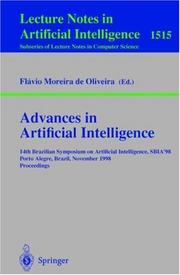
ISBN: 354065190X 9783540651901 3540495231 Year: 1998 Volume: 1515 Publisher: Berlin: Springer,
Abstract | Keywords | Export | Availability | Bookmark
 Loading...
Loading...Choose an application
- Reference Manager
- EndNote
- RefWorks (Direct export to RefWorks)
The Brazilian Symposium on Artificial Intelligence (SBIA) has been organized by the Interest Group on Artificial Intelligence of the Brazilian Computer Society (SBC) since 1984. In order to promote research in Artificial Intelligence and scientific interaction among Brazilian AI researchers and practitioners, and with their counterparts worldwide, it is being organized as an international forum since 1993. The SBIA proceedings have been published by Springer-Verlag as a part of the Lecture Notes in Artificial Intelligence (LNAI) series since 1995. The XIVth SBIA, held in 1998 at the PUCRS Campus in Porto Alegre, has maintained the international tradition and standards previously established: 61 papers were submitted and reviewed by an international program committee, from this number, 26 papers were accepted and are included in this volume. Of course, organizing an event such as SBIA demands a lot of group effort. We would like to thank and congratulate all the program committee members, and the many reviewers, for their work in reviewing and commenting on the submitted papers. We would also like to thank the Pontifical Catholic University of Rio Grande do Sul, host of the XIV SBIA, and the institutions which sponsored it - CNPq, CAPES, BANRISUL, among others. Last but not least, we want to thank all the kind people of the Local Organizing Committee, whose work made the event possible.
Artificial intelligence --- Knowledge representation (Information theory) --- Congresses --- Artificial intelligence. --- Artificial Intelligence. --- AI (Artificial intelligence) --- Artificial thinking --- Electronic brains --- Intellectronics --- Intelligence, Artificial --- Intelligent machines --- Machine intelligence --- Thinking, Artificial --- Bionics --- Cognitive science --- Digital computer simulation --- Electronic data processing --- Logic machines --- Machine theory --- Self-organizing systems --- Simulation methods --- Fifth generation computers --- Neural computers --- Artificial intelligence - Congresses --- Knowledge representation (Information theory) - Congresses
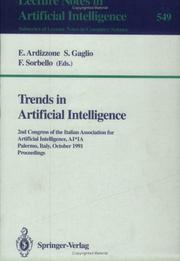
ISBN: 0387547126 3540547126 3540464433 Year: 1991 Volume: vol 549 vol *58 Publisher: Berlin New York Paris Springer-Verlag
Abstract | Keywords | Export | Availability | Bookmark
 Loading...
Loading...Choose an application
- Reference Manager
- EndNote
- RefWorks (Direct export to RefWorks)
This book collects the scientific papers presented at the 2nd Congress of the Italian Association for Artificial Intelligence, held in Palermo in October 1991. It displays the state of the art of both Italian and European scientific research in AI. The book begins with an invited paper by W. Wahlster et al. The bulk of the book is then divided into five parts on: - Knowledge representation (18 papers), - Knowledge acquisition (5 papers), - Natural language (5 papers), - Perception and robotics (5 papers), - Architecture and technologies (5 papers). A section containing short papers completes the book. The high quality of the papers reflects massive research activity mainly devoted to the theoretical aspects of AI, but clearly aimed at consolidating the results already achieved. Several contributions are oriented to the technological aspects of AI.
681.3*I2 --- Artificial intelligence. AI --- 681.3*I2 Artificial intelligence. AI --- Artificial intelligence --- Congresses --- Knowledge representation (Information theory) --- Artificial intelligence - Congresses. --- Knowledge representation (Information theory) - Congresses. --- Artificial intelligence. --- Artificial Intelligence. --- AI (Artificial intelligence) --- Artificial thinking --- Electronic brains --- Intellectronics --- Intelligence, Artificial --- Intelligent machines --- Machine intelligence --- Thinking, Artificial --- Bionics --- Cognitive science --- Digital computer simulation --- Electronic data processing --- Logic machines --- Machine theory --- Self-organizing systems --- Simulation methods --- Fifth generation computers --- Neural computers
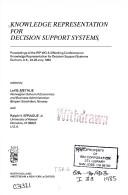
ISBN: 0444877398 9780444877390 Year: 1985 Publisher: Amsterdam: North-Holland,
Abstract | Keywords | Export | Availability | Bookmark
 Loading...
Loading...Choose an application
- Reference Manager
- EndNote
- RefWorks (Direct export to RefWorks)
Decision support systems --- Knowledge representation (Information theory) --- Congresses --- -Knowledge representation (Information theory) --- -681.3*H42 --- 681.3*I24 --- Management information systems --- Telematics --- Types of systems: decision support (e.g. MIS); logistics (Information systemsapplications --- Knowledge representation formalisms and methods: frames and scripts; predicate logic; relation systems; representation languages; procedural and rule-based representations; semantic networks (Artificial intelligence) --- 681.3*I24 Knowledge representation formalisms and methods: frames and scripts; predicate logic; relation systems; representation languages; procedural and rule-based representations; semantic networks (Artificial intelligence) --- 681.3*H42 Types of systems: decision support (e.g. MIS); logistics (Information systemsapplications --- 681.3*H42 --- Decision support systems - Congresses --- Knowledge representation (Information theory) - Congresses
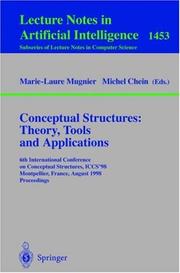
ISBN: 3540647910 9783540647911 3540686738 Year: 1998 Volume: 1453 Publisher: Berlin: Springer,
Abstract | Keywords | Export | Availability | Bookmark
 Loading...
Loading...Choose an application
- Reference Manager
- EndNote
- RefWorks (Direct export to RefWorks)
This book constitutes the refereed proceedings of the 6th International Conference on Conceptual Structures, ICCS'98, held in Montpellier, France, in August 1998. The 20 revised full papers and 10 research reports presented were carefully selected from a total of 66 submissions; also included are three invited contributions. The volume is divided in topical sections on knowledge representation and knowledge engineering, tools, conceptual graphs and other models, relationships with logics, algorithms and complexity, natural language processing, and applications.
Conceptual structures (Information theory) --- Graph theory --- Logic diagrams --- Knowledge representation (Information theory) --- Natural language processing (Computer science) --- Congresses --- Kennisrepresentatie (Informatietheorie) --- Représentation des connaissances (Théorie de l'information) --- Diagrams, Logic --- Diagrams --- Computer science. --- Artificial intelligence. --- Computer Science. --- Artificial Intelligence (incl. Robotics). --- Artificial Intelligence. --- AI (Artificial intelligence) --- Artificial thinking --- Electronic brains --- Intellectronics --- Intelligence, Artificial --- Intelligent machines --- Machine intelligence --- Thinking, Artificial --- Bionics --- Cognitive science --- Digital computer simulation --- Electronic data processing --- Logic machines --- Machine theory --- Self-organizing systems --- Simulation methods --- Fifth generation computers --- Neural computers --- Conceptual structures (Information theory) - Congresses --- Graph theory - Congresses --- Logic diagrams - Congresses --- Knowledge representation (Information theory) - Congresses --- Natural language processing (Computer science) - Congresses
Multi
ISSN: 10469567 ISBN: 1558601651 9781558601659 Year: 1991 Volume: vol *5 Publisher: San Mateo, Calif.: Morgan Kaufmann,
Abstract | Keywords | Export | Availability | Bookmark
 Loading...
Loading...Choose an application
- Reference Manager
- EndNote
- RefWorks (Direct export to RefWorks)
Knowledge representation (Information theory) --- Reasoning --- 681.3*F41 --- 681.3*I23 --- 681.3*I24 --- 681.3*I24 Knowledge representation formalisms and methods: frames and scripts; predicate logic; relation systems; representation languages; procedural and rule-based representations; semantic networks (Artificial intelligence) --- Knowledge representation formalisms and methods: frames and scripts; predicate logic; relation systems; representation languages; procedural and rule-based representations; semantic networks (Artificial intelligence) --- 681.3*I23 Deduction and theorem proving: answer/reason extraction; reasoning; resolution; metatheory; mathematical induction; logic programming (Artificial intelligence) --- Deduction and theorem proving: answer/reason extraction; reasoning; resolution; metatheory; mathematical induction; logic programming (Artificial intelligence) --- 681.3*F41 Mathematical logic: computability theory; computational logic; lambda calculus; logic programming; mechanical theorem proving; model theory; proof theory;recursive function theory--See also {681.3*F11}; {681.3*I22}; {681.3*I23} --- Mathematical logic: computability theory; computational logic; lambda calculus; logic programming; mechanical theorem proving; model theory; proof theory;recursive function theory--See also {681.3*F11}; {681.3*I22}; {681.3*I23} --- Congresses --- Knowledge representation (Information theory) - Congresses. --- Reasoning - Congresses. --- Knowledge representation (Information theory) - Congresses --- Reasoning - Congresses --- Non-Classical Logic --- Temporal Logic --- Frame Problem --- Non Monotonic Logic --- Modal Logic
Book
ISBN: 3540555277 0387555277 3642847862 3642847846 9783540555278 Year: 1992 Volume: 86 Publisher: Berlin: Springer,
Abstract | Keywords | Export | Availability | Bookmark
 Loading...
Loading...Choose an application
- Reference Manager
- EndNote
- RefWorks (Direct export to RefWorks)
Artificial intelligence --- Knowledge representation (Information theory) --- Physics --- Intelligence artificielle --- Représentation des connaissances --- Congresses --- Study and teaching --- Data processing --- Congrès --- -Knowledge representation (Information theory) --- -Physics --- -#PEDA *1.696 --- #PEDA *8.169 --- #PEDA *015.3 --- #PEDA *P 1.5 --- #PEDA *P 024 --- #PEDA *8.14.09:53 --- #PEDA *2.853 --- #PEDA *8.147 --- Natural philosophy --- Philosophy, Natural --- Physical sciences --- Dynamics --- AI (Artificial intelligence) --- Artificial thinking --- Electronic brains --- Intellectronics --- Intelligence, Artificial --- Intelligent machines --- Machine intelligence --- Thinking, Artificial --- Bionics --- Cognitive science --- Digital computer simulation --- Electronic data processing --- Logic machines --- Machine theory --- Self-organizing systems --- Simulation methods --- Fifth generation computers --- Neural computers --- -Data processing --- -Congresses --- Congresses. --- Représentation des connaissances --- Congrès --- #PEDA *1.696 --- Study and teaching&delete& --- Data processing&delete& --- Physics - Study and teaching - Data processing - Congresses --- Artificial intelligence - Congresses --- Knowledge representation (Information theory) - Congresses
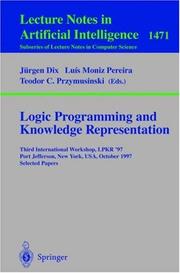
ISBN: 3540649581 9783540649588 3540498729 1280307552 9786610307555 3540247696 Year: 1998 Volume: 1471 Publisher: Berlin, Heidelberg : Springer Berlin Heidelberg : Imprint: Springer,
Abstract | Keywords | Export | Availability | Bookmark
 Loading...
Loading...Choose an application
- Reference Manager
- EndNote
- RefWorks (Direct export to RefWorks)
This book presents the thoroughly refereed post-workshop proceedings of the Third International Workshop on Logic Programming and Knowledge Representation, LPKR'97, held in Port Jefferson, NY, USA, in October 1997. The eight revised full papers presented have undergone a two-round reviewing process; also included is a comprehensive introduction surveying the state of the art in the area. The volume is divided into topical sections on disjunctive semantics, abduction, priorities, and updates.
Logic programming --- Knowledge representation (Information theory) --- Congresses --- Computer Science --- Engineering & Applied Sciences --- Congresses. --- Computer science. --- Architecture, Computer. --- Computer programming. --- Mathematical logic. --- Artificial intelligence. --- Computer Science. --- Computer System Implementation. --- Artificial Intelligence (incl. Robotics). --- Mathematical Logic and Formal Languages. --- Programming Techniques. --- AI (Artificial intelligence) --- Artificial thinking --- Electronic brains --- Intellectronics --- Intelligence, Artificial --- Intelligent machines --- Machine intelligence --- Thinking, Artificial --- Bionics --- Cognitive science --- Digital computer simulation --- Electronic data processing --- Logic machines --- Machine theory --- Self-organizing systems --- Simulation methods --- Fifth generation computers --- Neural computers --- Algebra of logic --- Logic, Universal --- Mathematical logic --- Symbolic and mathematical logic --- Symbolic logic --- Mathematics --- Algebra, Abstract --- Metamathematics --- Set theory --- Syllogism --- Computers --- Electronic computer programming --- Electronic digital computers --- Programming (Electronic computers) --- Coding theory --- Architecture, Computer --- Informatics --- Science --- Programming --- Computer network architectures. --- Artificial Intelligence. --- Architectures, Computer network --- Network architectures, Computer --- Computer architecture --- Software engineering. --- Software Engineering/Programming and Operating Systems. --- Software Engineering. --- Computer software engineering --- Engineering --- Logic programming - Congresses --- Knowledge representation (Information theory) - Congresses --- Computer architecture. --- Logic, Symbolic and mathematical.
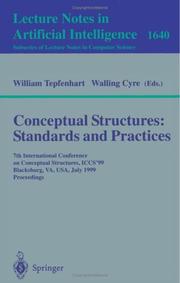
ISBN: 1280957751 9786610957750 3540486593 3540662235 Year: 1999 Publisher: Berlin, Heidelberg : Springer,
Abstract | Keywords | Export | Availability | Bookmark
 Loading...
Loading...Choose an application
- Reference Manager
- EndNote
- RefWorks (Direct export to RefWorks)
With all of the news about the Internet and the Y2K problem, it is easy to forget that other areas of computer science still exist. Reading the newspaper or watching the television conveys a very warped view of what is happening in computer science. This conference illustrates how a maturing subdiscipline of computer science can continue to grow and integrate within it both old and new approaches despite (or perhaps due to) a lack of public awareness. The conceptual graph community has basically existed since the 1984 publication of John Sowa's book, "Conceptual Structures: Information Processing In Mind and Machine." In this book, John Sowa laid the foundations for a knowledge representation model called conceptual graphs based on semantic networks and the existential graphs of C.S. Peirce. Conceptual graphs constitutes a very powerful and expressive knowledge representation scheme, inheriting the benefits of logic and the mathematics of graphs. The expressiveness and formal underpinnings of conceptual graph theory have attracted a large international community of researchers and scholars. The International Conferences on Conceptual Structures, and this is the seventh in the series, is the primary forum for these researchers to report their progress and activities. As in the past, the doors were open to admit alternate representation models and approaches.
Conceptual structures (Information theory) -- Congresses. --- Graph theory -- Congresses. --- Knowledge representation (Information theory) -- Congresses. --- Logic diagrams -- Congresses. --- Natural language processing (Computer science) -- Congresses. --- Conceptual structures (Information theory) --- Graph theory --- Logic diagrams --- Knowledge representation (Information theory) --- Natural language processing (Computer science) --- Computer Science --- Engineering & Applied Sciences --- Diagrams, Logic --- Logic --- Diagrams --- Graphic methods --- Computer science. --- Computers. --- Algorithms. --- Mathematical logic. --- Computer science --- Artificial intelligence. --- Computer Science. --- Artificial Intelligence (incl. Robotics). --- Theory of Computation. --- Discrete Mathematics in Computer Science. --- Mathematical Logic and Formal Languages. --- Algorithm Analysis and Problem Complexity. --- Mathematics. --- Information theory. --- Computational complexity. --- Computer software. --- Artificial Intelligence. --- AI (Artificial intelligence) --- Artificial thinking --- Electronic brains --- Intellectronics --- Intelligence, Artificial --- Intelligent machines --- Machine intelligence --- Thinking, Artificial --- Bionics --- Cognitive science --- Digital computer simulation --- Electronic data processing --- Logic machines --- Machine theory --- Self-organizing systems --- Simulation methods --- Fifth generation computers --- Neural computers --- Informatics --- Science --- Complexity, Computational --- Communication theory --- Communication --- Cybernetics --- Software, Computer --- Computer systems --- Computer science—Mathematics. --- Algorism --- Algebra --- Arithmetic --- Algebra of logic --- Logic, Universal --- Mathematical logic --- Symbolic and mathematical logic --- Symbolic logic --- Mathematics --- Algebra, Abstract --- Metamathematics --- Set theory --- Syllogism --- Automatic computers --- Automatic data processors --- Computer hardware --- Computing machines (Computers) --- Electronic calculating-machines --- Electronic computers --- Hardware, Computer --- Calculators --- Cyberspace --- Foundations
Book
ISBN: 3642030785 9786612331855 128233185X 3642030793 Year: 2009 Publisher: Berlin ; Heidelberg ; New York : Springer,
Abstract | Keywords | Export | Availability | Bookmark
 Loading...
Loading...Choose an application
- Reference Manager
- EndNote
- RefWorks (Direct export to RefWorks)
This book constitutes the refereed proceedings of the 17th International Conference on Conceptual Structures, ICCS 2009, which took place in Moscow, Russia, on July 26-31, 2009. The 18 papers presented together with 5 invited contributions were carefully reviewed and selected from approximately 50 submissions. Originally centered around research on knowledge representation and reasoning with conceptual graphs, over the years ICCS has broadened its scope to include innovations from a wider range of theories and related practices, among them other forms of graph-based formalisms like RDF or existential graphs, formal concept analysis, semantic Web technologies, ontologies, concept mapping and more.
Conceptual structures (Information theory) --Congresses. --- Graph theory --Congresses. --- Knowledge representation (Information theory) --Congresses. --- Logic diagrams --Congresses. --- Conceptual structures (Information theory) --- Graph theory --- Logic diagrams --- Knowledge representation (Information theory) --- Computer Science --- Mechanical Engineering - General --- Mechanical Engineering --- Engineering & Applied Sciences --- Information Technology --- Artificial Intelligence --- Semantic networks (Information theory) --- Semantic net (Information theory) --- Semantic nets (Information theory) --- Computer science. --- Computer programming. --- Programming languages (Electronic computers). --- Algorithms. --- Mathematical logic. --- Computer science --- Artificial intelligence. --- Computer Science. --- Artificial Intelligence (incl. Robotics). --- Programming Techniques. --- Programming Languages, Compilers, Interpreters. --- Discrete Mathematics in Computer Science. --- Mathematical Logic and Formal Languages. --- Algorithm Analysis and Problem Complexity. --- Mathematics. --- AI (Artificial intelligence) --- Artificial thinking --- Electronic brains --- Intellectronics --- Intelligence, Artificial --- Intelligent machines --- Machine intelligence --- Thinking, Artificial --- Bionics --- Cognitive science --- Digital computer simulation --- Electronic data processing --- Logic machines --- Machine theory --- Self-organizing systems --- Simulation methods --- Fifth generation computers --- Neural computers --- Computer mathematics --- Discrete mathematics --- Algebra of logic --- Logic, Universal --- Mathematical logic --- Symbolic and mathematical logic --- Symbolic logic --- Mathematics --- Algebra, Abstract --- Metamathematics --- Set theory --- Syllogism --- Algorism --- Algebra --- Arithmetic --- Computer languages --- Computer program languages --- Computer programming languages --- Machine language --- Languages, Artificial --- Computers --- Electronic computer programming --- Electronic digital computers --- Programming (Electronic computers) --- Coding theory --- Informatics --- Science --- Foundations --- Programming --- Artificial intelligence --- Information theory --- Semantic computing --- Computational complexity. --- Computer software. --- Artificial Intelligence. --- Software, Computer --- Computer systems --- Complexity, Computational --- Computer science—Mathematics.
| Listing 1 - 10 of 11 | << page >> |
Sort by
|

 Search
Search Feedback
Feedback About UniCat
About UniCat  Help
Help News
News